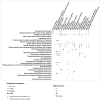Updated EANO guideline on rational molecular testing of gliomas, glioneuronal, and neuronal tumors in adults for targeted therapy selection-Update 1
- PMID: 39387386
- PMCID: PMC11812046
- DOI: 10.1093/neuonc/noae213
Updated EANO guideline on rational molecular testing of gliomas, glioneuronal, and neuronal tumors in adults for targeted therapy selection-Update 1
Abstract
The standard of care for adult patients with gliomas, glioneuronal, and neuronal tumors consists of combinations of surgery, radiotherapy, and chemotherapy. For many systemic cancers, targeted treatments are a major part of the standard treatment; however, the predictive significance of most of the targets for treatment in systemic cancer is less well-established in central nervous system tumors. In 2023 the European Association for NeuroOncology (EANO) Guideline Committee presented evidence-based recommendations for rational testing of molecular targets for targeted treatments. From all targets reviewed, only testing for BRAF V600E mutations was of proven clinical benefit; despite regulatory approvals for tumor agnostic treatment of NTRK gene fusions and high tumor mutational burden (TMB) for patients with adult brain tumors, the evidence of clinical benefit for adult patients was still limited. This guideline has a modular structure, allowing regular updating of individual sections and adding new ones. The present version (Update 1) presents a review of the rationale of testing for PTEN, H3F3A, MTAP, RET and IDH, and presents an update of the text on TMB high and mismatch repair deficiency. It also presents an overview of the therapeutic yield of routine next-generation sequencing for mutations and fusion detection. The Supplemental File II accompanying this version contains an in-depth review of all targets, whereas, in the main manuscript, the final recommendations of the revised and new targets are presented. Updates will be made on a regular basis.
Keywords: (glio)neuronal tumors; EANO guideline; IDH; diffuse glioma; targeted treatment.
© The Author(s) 2024. Published by Oxford University Press on behalf of the Society for Neuro-Oncology. All rights reserved. For commercial re-use, please contact reprints@oup.com for reprints and translation rights for reprints. All other permissions can be obtained through our RightsLink service via the Permissions link on the article page on our site—for further information please contact journals.permissions@oup.com.
Conflict of interest statement
M.J.v.d.B. has received honoraria for consultancy from Anheart Therapeutics, Boehringer Ingelheim, Fore Biotherapeutics, Genenta, Incyte, Mundipharm, Chimerix, Roche, and Servier and support for travel to meetings by Servier. E.F. has nothing to disclose; M.T. has received Consulting from Servier, Novocure, TherAguix, Ono, Resilience; Research Grants from Sanofi; PJF has nothing to disclose; A.I. reports travel funding from Carthera, Leo Pharma; research grants from Transgene, Sanofi, Air Liquide and Nutritheragene; Consulting from Novocure, Novartis, Polytone Laser, Leo Pharma, Boehringer Ingelheim; G.L. declares consulting or advisory role funding from AbbVie, Bayer, Novartis, Orbus Therapeutics, BrainFarm, Celgene, Cureteq, Health4U, Braun, Janssen, BioRegio STERN, Servier, and Novocure; and travel funding from Roche and Bayer; R.R. Consulting from Novocure, Servier, Genenta, CureVac; Grants from Bayer; L.S. has nothing to disclose; D.C. has receivedresearch grants from Novocure; co-funder of Heidelberg Epigostix GmbH; P.W. has nothing to disclose; M.S. has received consulting from Genenta, Servier, Novocure, Research Grants from Astra-Zeneca and BMS’; M.W. has received research grants from Novartis, Quercis and Versameb, and honoraria for lectures or advisory board participation or consulting from Anheart, Bayer, Curevac, Medac, Neurosense, Novartis, Novocure, Orbus, Pfizer, Philogen, Roche and Servier; M.E. has received consulting fees from Alexion, travel grant from Genenta; E.A., F.B., P.E. have nothing to disclose; M.G. has received a research grant from Evgen Pharm; P.Y.W. has received research support from Astra Zeneca, Black Diamond, Bristol Meyers Squibb, Chimerix, Eli Lily, Erasca, Global Coalition For Adaptive Research, Kazia, MediciNova, Merck, Novartis, Quadriga, Servier, VBI Vaccines. Advisory Board/Consultant: Anheart, Astra Zeneca, Black Diamond, Celularity, Chimerix, Day One Bio, Genenta, Glaxo Smith Kline, Kintara, Merck, Mundipharma, Novartis, Novocure, Prelude Therapeutics, Sagimet, Sapience, Servier, Symbio, Tango, Telix, VBI Vaccines; M.P. has received honoraria for lectures, consultation or advisory board participation from the following for-profit companies: Bayer, Bristol-Myers Squibb, Novartis, Gerson Lehrman Group (GLG), CMC Contrast, GlaxoSmithKline, Mundipharma, Roche, BMJ Journals, MedMedia, Astra Zeneca, AbbVie, Lilly, Medahead, Daiichi Sankyo, Sanofi, Merck Sharp & Dome, Tocagen, Adastra, Gan & Lee Pharmaceuticals, Janssen, Servier, Miltenyi, Böhringer-Ingelheim, Telix, Medscape.
Figures

References
-
- Sahm F, Schrimpf D, Jones DT, et al. Next-generation sequencing in routine brain tumor diagnostics enables an integrated diagnosis and identifies actionable targets. Acta Neuropathol. 2016;131(6):903–910. - PubMed
Publication types
MeSH terms
Substances
LinkOut - more resources
Full Text Sources
Medical
Research Materials

